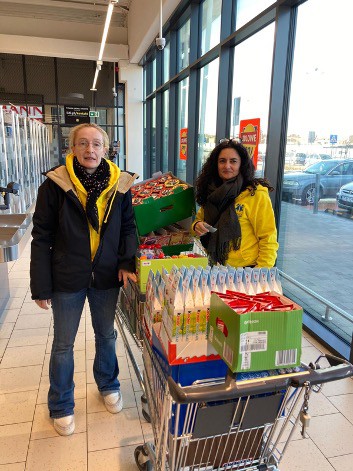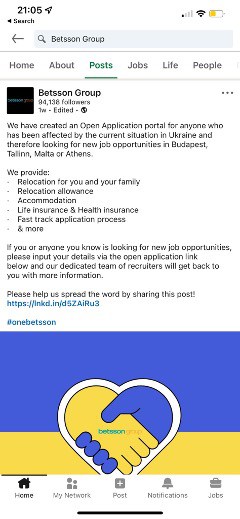Another post by my wife from the Polish border with Ukraine.

It only takes a few days of observation to understand that humanitarian help to millions of Ukrainian refugees here in Poland has just been a miracle. Millions have crossed the borders, and have been helped to find temporary shelters, accommodation and transport to other countries through a number of organisations that work independently of each other. They have made miracles handling every refugee with care and a human touch, avoiding having to open refugee camps, that would make the future of Ukrainians crossing the border so much more uncertain.
As it stands now in Poland, refugees have 14 days to register themselves for refugee status in Poland. This means they get 14 days to decide whether to take free transport to another country, without having to be attached to a status that would prevent them from moving to anywhere else and that would prevent them from working in Poland for a number of months, depending instead on social benefits.
However, it only takes a few days to realise that the lack of coordination of the efforts eats into the efficiency of the shared mission. It prevents the optimisation of the allocation of resources, human and otherwise. It becomes more apparent that, if there is to be a second wave of arrivals that is in any case expected to be three times as large as the first one, all these independent organisations will not be able to cope on their own.
Take Olga and her husband for example, that have given their house away to create a temporary shelter. They spend their day on the phone, coordinating transport to different countries and trying to fill up buses, so none of them leave half empty while potential passengers are left stranded.
There is no central place where they can check if there is a bus for Germany leaving from Lublin today and how many places are available. They are relying on their network to organise transport. This morning they had a bus for Germany: they needed 30 people but they could only gather 19. Without doubt, there were many other refugees in Lublin who would have loved to take that bus, but there was no way of knowing about them because of the absence of central coordination.
Another example. Yesterday I drove up to the border, as we were asked for soft toys for arriving kids. I got there with my shipment of stuffed animals only to be told they had run out of a number of vital supplies.
We went shopping for hand creams, baby food, chocolates, juices, noodles, and instant soups and drove back to the deliver them to the border. On our way back, we stopped at the reception centre, located 2 km away to check if anyone needed transport to the shelter in Lublin. Thankfully, everyone was sorted. However, we were told they also needed food delivered. We’ll have to make another trip there tomorrow to deliver whatever they asked for.
At the reception centre, they did not know about the existence of the Lillowa Centre (Olga’s house) and that they offered transport there. The refugees had no idea a way out was available to them so close to the border.
This goes to show, that someone, somewhere – maybe Europe? – needs to develop a central management system that would link all these voluntary initiatives together in order to have a much better distribution of tasks and efforts, in order to ensure that the response to the distress of the Ukrainian people is optimised as much as possible.
There are other initiatives happening in Europe that need to be made known to the people of Ukraine crossing the border.
Take this great initiative by Betsson for example. Everyone that has been on the border, or in a temporary shelter, will tell you they would not expect a mother that has just hiked across Ukraine and crossed the border with her children in tow to prioritise a pop into LinkedIn. But look at this:

Clearly sharing this post is not enough for them to be aware that Betsson is facilitating jobs and relocation. There is a desperate need of centralising these opportunities so that every refugee can be told where to look for them.
We all need to remember that Russia’s invasion of Ukraine is not just a problem for Ukrainians. This is a challenge for Europe. The management of operations helping refugees should also be a European problem and someone needs to step up to ensure that all these people that are giving their time and money to support this cause independently of each other, can have the right tools to do so in an efficient manner.